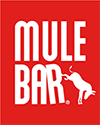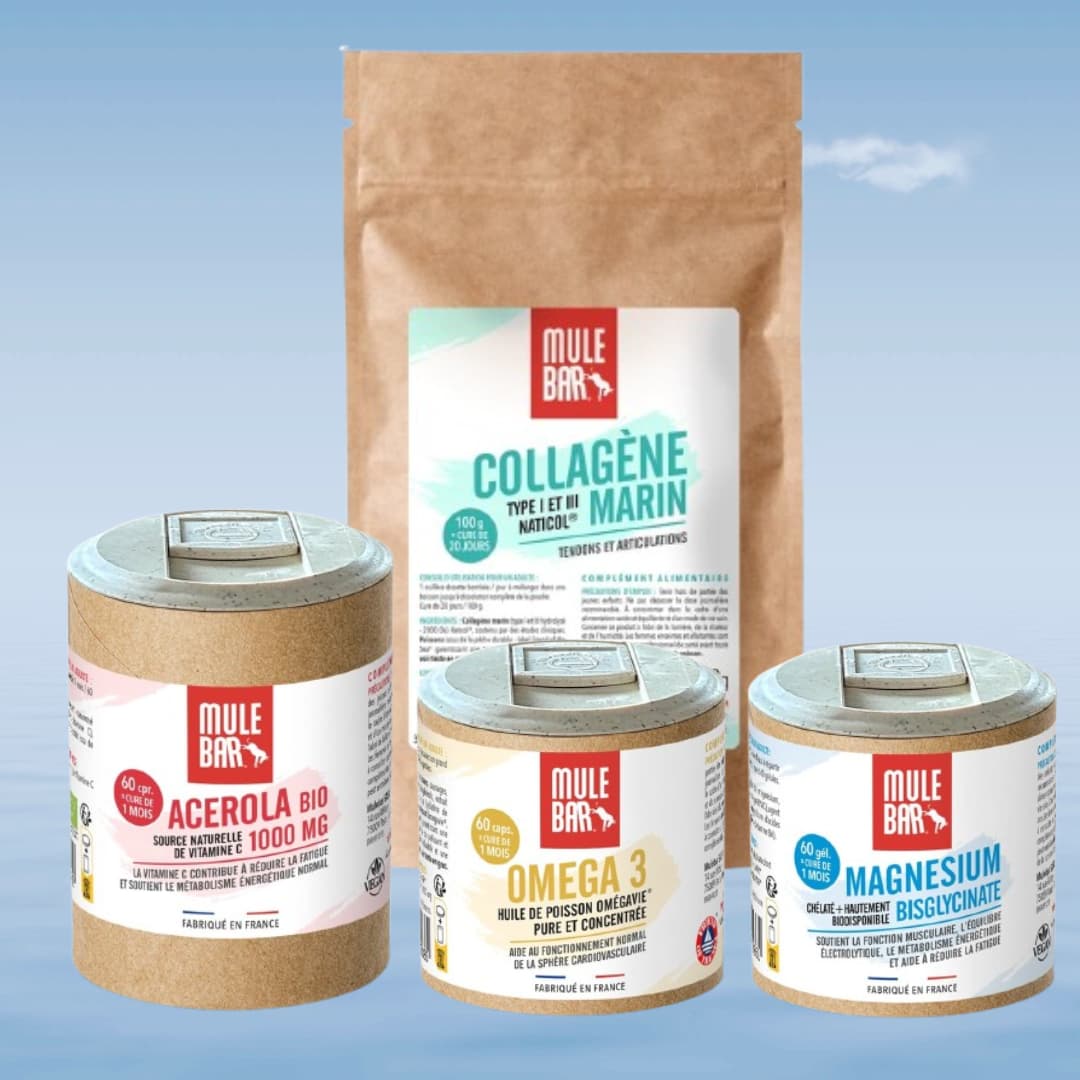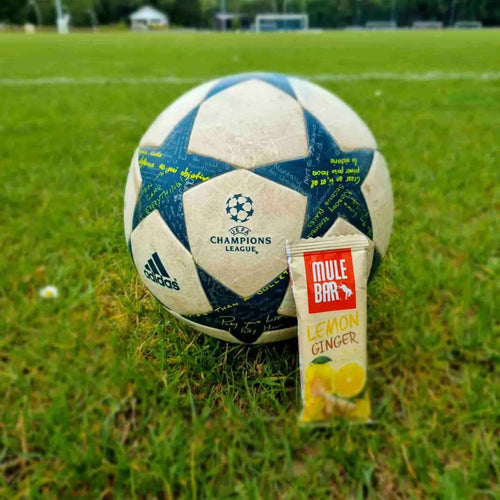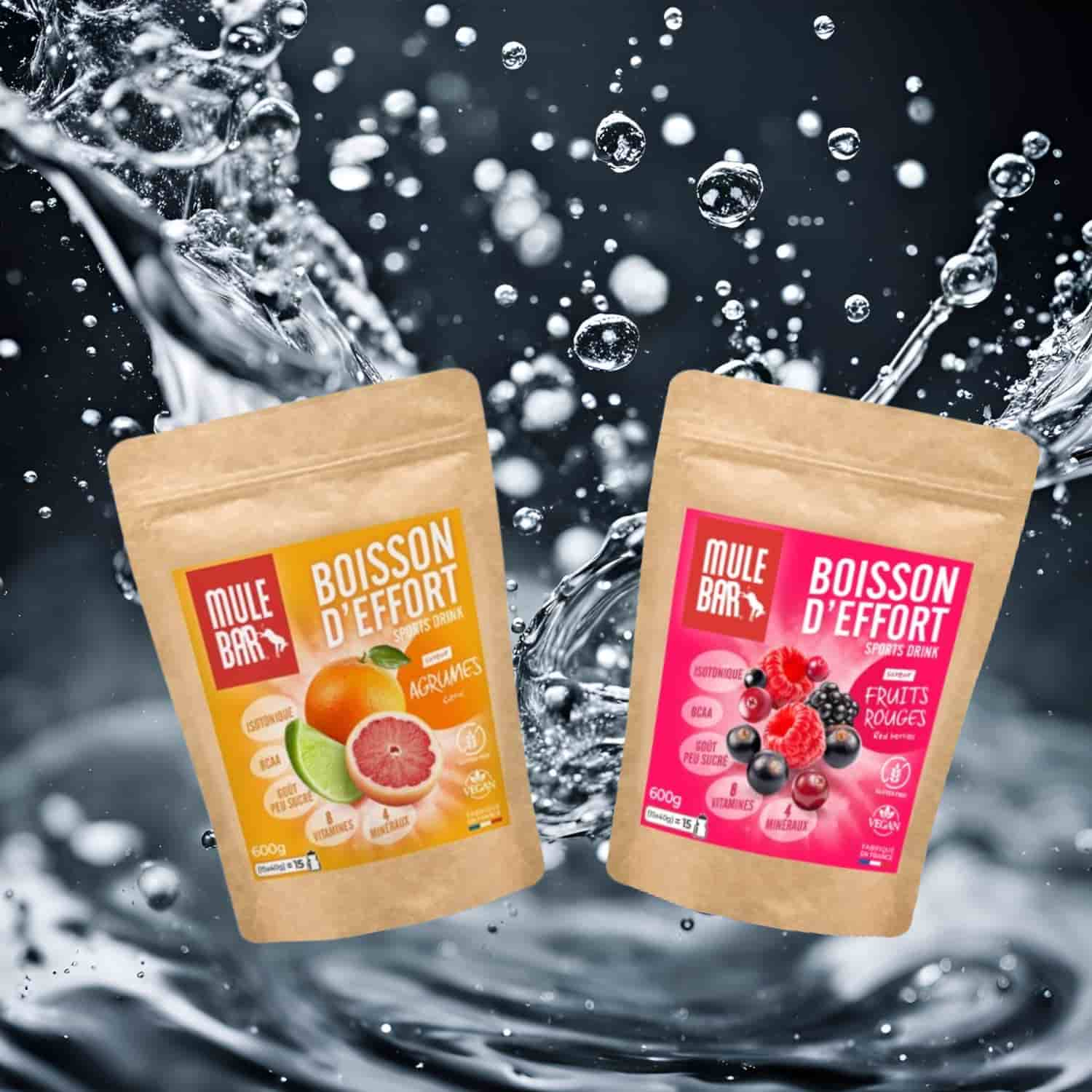Endurance sports, such as running (road and trail), cycling and by extension triathlon, require you to pay close attention to your diet before, during and after exercise. This is why there is a real culture of sports nutrition in these sports and it is very logical that we find well-stocked shelves of sports nutrition products in specialist stores. Other sports seem to ignore this subject, whether it is tennis, golf, swimming or team sports. The proof is that we only find industrial snack bars in club houses, stadium bars or vending machines. No store dedicated to one of these sports has a nutrition section. The impasse is complete!
Yet nutrition is crucial for every human being. It remains our only fuel and even more so for athletes, whatever the sport practiced. Footballers are no exception to this necessity. It is not because the duration of a match is only 90 minutes that nutrition is not a major issue. To maximize their performance on the field, maintain their endurance, and optimize their recovery, footballers must follow a specific and balanced diet. This guide presents the main aspects of footballer's nutrition in order to help maintain a high level of performance and good overall health.
The basics of our diet
Our diet is made up of macronutrients (lipids, carbohydrates, proteins) that are essential for good general health. Footballers have higher energy needs than the average sedentary person due to the intensity and duration of their physical efforts. A footballer's diet must not only provide sufficient energy, but also help with recovery and muscle strengthening, while ensuring good hydration.
Calories and Energy : The average soccer player burns between 2,000 and 4,000 calories per day, depending on his weight, training level, weather conditions and duration of exercise. These calories should come from balanced sources of carbohydrates, proteins, and fats.
- Carbohydrates : Carbohydrates are the main source of energy for muscles during intense exercise. Footballers should aim to get around 55-60% of their daily calories from complex carbohydrates such as brown rice, whole grain pasta, vegetables, and legumes.
- Protein : Protein is essential for muscle repair and growth. A daily intake of 1.2 to 1.7 grams of protein per kilogram of body weight is recommended, depending on the intensity of training.
- Fats : Fats also play an important role, including providing essential fatty acids and aiding in the absorption of vitamins. Fats should make up about 20-30% of total calories, with an emphasis on unsaturated fats like olive oil, avocado, and nuts.
- Hydration : Water is essential to maintain hydration. Sports drinks can be used during games and extended workouts to replace electrolytes lost through sweat.
What breakfast for a footballer?
For a football-friendly breakfast, it's important to focus on foods that provide energy, protein, and essential nutrients to support endurance, performance, and muscle recovery. Here's a suggestion for a balanced and nutritious breakfast.
Proteins :
- Vegetable omelette (spinach, tomatoes, peppers) with a little low-fat cheese. Eggs provide high-quality protein needed for muscle repair.
- Protein smoothie with milk or a protein-enriched plant-based alternative, a banana, berries, and a scoop of protein powder (whey or plant-based).
Complex Carbohydrates :
- Whole grain or cereal bread, spread with peanut or almond butter, rich in good fats and vegetable proteins.
- Oatmeal (but in small quantities to avoid too much insulin secretion in the morning) with fresh fruit (bananas, berries, apples) and chia or flax seeds for fiber and omega-3 fatty acids.
Fruits and Fibers :
- Fresh fruits like berries, oranges, or apples which provide vitamins, minerals and antioxidants.
- An apple or orange for vitamin C and fiber, or a bowl of berries for a boost of antioxidants.
Hydration :
- A hydration drink and a coffee or green tea for a slight energy boost without overdoing the caffeine.
What is the ideal meal before a football match (3-4 hours before)?
The famous pre-match meal should maximize muscle glycogen stores, provide enough protein for recovery without causing heaviness, and include cooked vegetables for micronutrients. It should be low in fat and insoluble fiber to avoid gastrointestinal upset.
Here is a balanced suggestion that can be taken about 3 to 4 hours before the game:
Complex Carbohydrates (60-70% of the meal):
- Whole grain pasta or brown rice: Carbohydrates are the main source of energy during a football match. Pasta or rice provide complex carbohydrates that digest slowly, providing long-lasting energy.
- For variation, quinoa or sweet potato are alternatives that are also rich in fiber and complex carbohydrates.
Moderate Protein (20-25% of meal):
- Grilled chicken breast or turkey, rabbit, veal: Lean source of protein that helps with muscle recovery without being too heavy to digest.
- Lean fish (such as hake, monkfish, pollock, cod or sole): Also contains protein and omega-3 fatty acids which help reduce inflammation.
Cooked or Steamed Vegetables (10-15% of the meal):
- Steamed vegetables (broccoli, zucchini, carrots): Cooked vegetables are easier to digest than raw ones and provide vitamins, minerals and antioxidants essential for performance and recovery.
- Light green salad with a low-fat dressing (olive oil, lemon) to avoid heavy fats.
Fresh Fruits:
- Banana or applesauce: Quick sources of carbohydrates that can be eaten right after a meal or even an hour before the game for an energy boost.
- Red or orange fruits for vitamins and antioxidants.
Hydration:
Drink water throughout the meal and in small quantities regularly until the match. Hydration is crucial to maintain energy levels and prevent cramps. A loss of 2% of water in the body results in a 20% decrease in physical performance. A light isotonic drink can be taken just before the match to maintain electrolyte (mineral salt) levels.
What snack 15 minutes before the match?
An energy bar or energy compote rich in natural ingredients and easy to digest during exercise. These products contain superfoods such as goji berries and quinoa.
Hydration: what to drink during the match?
Regular hydration with mineral-rich water or isotonic sports drink to maintain electrolyte balance and energy. They contain electrolytes (sodium, potassium) and carbohydrates to help maintain hydration and energy. Ideal for quickly replenishing what has been lost through sweat. Each player should have their own water bottle at the edge of the pitch or next to the goals for easy access during stoppages. Ideally, they should consume between 200 and 300ml every 15 minutes and 500ml at half-time.
What to eat at half-time of a football match?
At halftime in a football game, the goal is to quickly replenish energy stores and hydrate without causing heaviness or digestive discomfort. Foods should be easy to digest, rich in fast carbohydrates, and low in fat and fiber. Here are some suitable suggestions for a halftime snack:
Fruits rich in simple carbohydrates :
- Banana : Easy to digest, high in potassium, and provide a quick source of carbohydrates to maintain energy.
- Orange segments : Rich in vitamin C and hydration, they provide a refreshing energy boost that is quick and very easy to eat.
Natural Energy Bars :
- Fruit-based energy bars like Mulebar, which contain natural ingredients like mango, cashew, chocolate, and goji berries. They are designed for easy digestion and provide quick energy thanks to the natural sugars in the fruit and brown rice syrup.
Energy gels :
- Rich in fast, easy-to-absorb carbohydrates and available in a variety of flavors (cherry, apple, lemon-ginger, salted caramel and coffee), Mulebar energy gels can be consumed quickly and provide an almost immediate boost of energy without weighing down the stomach.
Dried fruits and energy compotes :
- Fruit compotes : easy to digest and provide quick carbohydrates.
- Raisins or dried apricots : rich in natural sugars and soluble fiber, they will help maintain energy.
All professional football teams now have a dietician who offers personalized plans to each player. It is also very common to see players consuming energy gels in the locker room at half-time.
What to eat to recover well after a football match (30-60 minutes later)?
It is advisable to eat a meal (or snack) rich in protein and carbohydrates to help with muscle recovery and replenish glycogen stores. For example: a banana and almond milk smoothie with protein powder, eggs, Greek yogurt, nuts, beans, a chicken and vegetable wrap, red meat, salmon and fruits and vegetables to continue the recovery process.
The Importance of Recovery and Supplements
- Recovery : After a game or intense workout, recovery is essential. Protein helps repair muscle fibers, while carbohydrates replenish glycogen stores.
- Supplements : Supplements such as protein powder, creatine, and BCAAs (branched chain amino acids) may be helpful for some footballers, but should not replace a balanced diet.
Nutrition plays a fundamental role in a footballer’s performance and health. By adopting a balanced nutritional approach that includes a combination of complex carbohydrates, high-quality proteins, healthy fats, and adequate hydration, players can maximize their potential on the pitch and reduce the risk of injury. Planning meals around training and matches, and incorporating effective recovery strategies are also key elements of an ideal footballer’s diet.
A well-thought-out diet is therefore a direct investment in sports performance and overall well-being. If all this is new to you, know that it is never too late to rebalance your diet. If you cannot do it alone, get help from a dietician nutritionist. They will be able to adapt the ideal diet to your sports practice.
FAQ
What foods should you avoid before exercising?
Before exercising, it is essential to choose foods that support performance and avoid digestive discomfort. Some foods can cause bloating, cramps, or digestive fatigue that can hinder the effectiveness of training or competition. Here is a list of foods to avoid before exercising:
Foods high in fat:
- Fried foods (like fries, nuggets, etc.): Fats slow down digestion, which can cause a feeling of heaviness and gastrointestinal discomfort.
- Fatty meats (fatty beef, pork, lamb): They take longer to digest and can cause bloating. Kebabs to be avoided!
- Hard cheeses and high-fat creams: These can also slow digestion and cause bloating.
Foods high in fiber:
- Raw vegetables (like cabbage, broccoli, cauliflower): Although healthy, they can cause gas and bloating due to their high insoluble fiber content.
- Legumes (like lentils, beans, chickpeas): These are high in fiber and can cause bloating and gas.
- Whole grain bread or high fiber cereals: Avoid just before training as they can cause a feeling of heaviness.
Refined sugars and sugary foods:
- Sweets, pastries, chocolates and other foods high in sugar: These can cause blood sugar levels to drop rapidly after a sudden spike, causing fatigue and lack of energy.
- Sugary sodas: Not only do they contain added sugars, but the bubbles can also cause bloating.
Spicy foods:
- Very spicy foods (such as hot curries or spicy Mexican dishes): These can cause heartburn and gastrointestinal upset during exercise.
Foods that are too salty:
- Salty snacks (chips, pretzels, salted peanuts): High salt content can cause dehydration and muscle cramps.
Alcohol and caffeine:
- Alcoholic beverages (including beer) are dehydrating and impair coordination and performance.
- Excessive caffeine (strong coffee, energy drinks) can cause heart palpitations, anxiety, or stomach upset.
Whole dairy products:
- Dairy products, ice cream, and full-fat yogurts: These are high in fat and can be difficult to digest, causing stomach discomfort.






Leave a comment
This site is protected by hCaptcha and the hCaptcha Privacy Policy and Terms of Service apply.